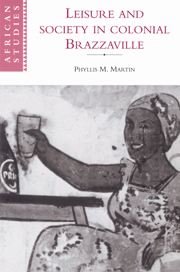Book contents
- Frontmatter
- Contents
- List of plates
- List of maps
- List of tables
- Acknowledgements
- List of abbreviations
- Introduction
- 1 An African crossroads, a frontier post and a colonial town, c. 1880–1915
- 2 Taking hold of the town, c. 1915–1960
- 3 The emergence of leisure
- 4 Football is king
- 5 About the town
- 6 Dressing well
- 7 High society
- Conclusion
- Notes
- Bibliography
- Index
- Titles in the series
7 - High society
Published online by Cambridge University Press: 09 November 2009
- Frontmatter
- Contents
- List of plates
- List of maps
- List of tables
- Acknowledgements
- List of abbreviations
- Introduction
- 1 An African crossroads, a frontier post and a colonial town, c. 1880–1915
- 2 Taking hold of the town, c. 1915–1960
- 3 The emergence of leisure
- 4 Football is king
- 5 About the town
- 6 Dressing well
- 7 High society
- Conclusion
- Notes
- Bibliography
- Index
- Titles in the series
Summary
Europeans liked to be photographed beside the Congo rapids. An illustration in her memoirs shows Gabrielle Vassal sitting on top of a boulder laughing at the camera, while apparently surrounded by the turbulent waters. A group photograph of the Government House set in the mid-1920s shows elegantly dressed women standing beside white-uniformed men, all wearing helmets. They are smiling and apparently enjoying their outing to the favourite tourist spot, while the Congo cataracts, which had barred Europeans from the Pool for centuries, rush by in the background. The whole image is of white power.
Recent research has shown, however, that the people we call ‘Europeans’ or ‘colonizers’ were neither as monolithic as those terms suggest, nor as invulnerable as their photographs make them seem. Even in settler colonies with substantial investment from private capital or colonial ministries, Europeans were often weak, impermanent and divided. How much more so in French Equatorial Africa? Appearances were, therefore, highly important in colonial relationships, for they could mask uncertainty, project authority and create social and psychological distance between the ‘colonizer’ and the ‘colonized’.
Leisure activities, significant in drawing imaginary lines, were also highly problematic, for they were more fluid and open to personal interpretation than activities at work where the relationship of boss and worker was clear. The question in the colonial relationship was how to create the social distance necessary for the security and well-being of the dominant group, both in the early period when white men were strug'gling to survive in the face of high mortality rates and poor resources, and at a later period when women and children also had to be protected and ensured a comfortable existence.
- Type
- Chapter
- Information
- Leisure and Society in Colonial Brazzaville , pp. 173 - 197Publisher: Cambridge University PressPrint publication year: 1996



